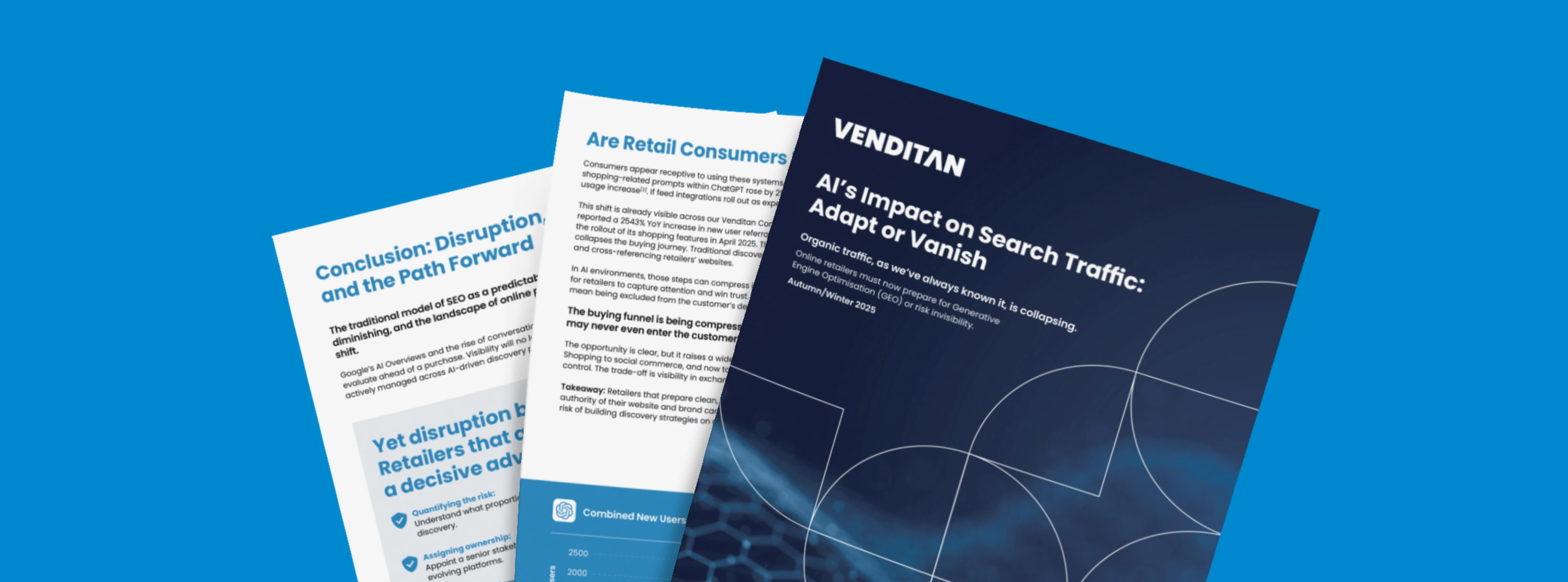From new recipes to new cars, settling a debate or discovering a new brand, whatever you’re looking for online, most searches start with a Google. It’s so important for retailers to find an SEO friendly eCommerce platform to help them rank and stand out from the competition.
With so much choice out there, shoppers don’t just log on and go directly to a brand’s website. According to statistics from Google, 9 out of 10 shoppers are not certain of the brand they want to buy from when they begin searching online. This means there’s a huge opportunity for retailers.
Shoppers are savvier than ever and will shop around for brands that meet their expectations on things like price, sustainability, and delivery options. Google is the most popular way for shoppers to find retailers that fit their requirements. Using an SEO friendly eCommerce platform puts you in a much better position to target these customers and their preferences.
SEO is super important for retailers selling online. Having the right optimisation in place on your website will help you rank higher for what you want your business to be found for. It also helps target users on specific queries and unique selling points, like sustainable clothing or next day delivery.
If you’re not entirely sure where to start, we’ve put together some of the features you should look for in an SEO friendly eCommerce platform.
Quick links:
5. Titles and meta descriptions
7. Blogging
1. SEO friendly URLs
Whilst on the subject of domains, it’s also important to be able to edit and optimise your URLs for SEO. This means your platform should allow you to use keyword-rich URLs like /blue-tapered-trousers rather than /product-id-815.
2. Set up 301 redirects
This is especially important for any SEO friendly eCommerce platform to allow you to do. You’ll find yourself often deleting pages as products go out of stock, or new lines come in. Setting up 301 redirects means you can direct traffic from these old URLs to new product pages.
3. SEO friendly navigation
Shoppers need to be able to explore your website with ease. In order to crawl and rank your website, Google bots also need to be able to navigate your website easily. Search friendly navigation means enabling links around the site that are text and not image, that is easy to edit on your CMS.
4. Automated XML sitemaps
Automated XML sitemaps let Google crawl your site more quickly which helps improve indexing speed and rankings. An SEO friendly eCommerce platform will do this for you automatically when updates to your website are made so that the most up to date version is available for Google to crawl.
Make sure you have the ability to update sitemap priorities, where you can mark specific pages as a priority for Google to crawl and index. This works well for exclusives and other landing pages that may change often. Google is always working to prioritise your new and content that undergoes frequent edits.
5. Editing page titles and meta descriptions
Your eCommerce platform should offer you the ability to edit page titles and meta descriptions for all pages. This includes landing pages, category and product pages. Keyword-rich page titles and descriptions will help you rank higher for specific search terms and phrases on the search engine results page.

6. Custom landing pages
Using an eCommerce platform that allows you to create custom landing pages will benefit your SEO greatly. This allows you to use the research from things like the above Google Analytics capabilities and feed into your website’s pages. Target specific keywords and audience segments based on popular searches and your unique selling points that people may be searching for.
7. Blogging
Content marketing is extremely effective and works across industries. A blog helps add value to your customers whether that’s through entertaining pieces, educational resources, or product support guides. At the same time, a blog helps boost SEO efforts, which is why it’s really important to find an eCommerce platform that allows you to publish a blog. Look for additional features such as a comments section, RSS feed and social media sharing that all contribute to SEO rankings.
8. Super-fast websites
Slow websites impact search engine rankings. For Google, user experience is the most important factor and a slow website does not give a good user experience. Make sure you find an SEO friendly eCommerce platform that is super-fast. Site speed also impacts other measurables like bounce rate and time on site, which can also indirectly impact your SEO. Use insights like these on Google analytics to identify any potential issues.
9. Editing alt tags
The ability to edit your image alt tags will help your SEO and ranking in search results. Optimised images are extremely beneficial to retailers as you can use as a part of your approach to keyword targeting for the products they are displaying. This is a basic feature for an SEO friendly eCommerce platform that can make a big difference!
10. Adding extra specification details
The ability to add extra specification details to product pages is a great way to improve SEO. Find a platform that doesn’t restrict this and allows you to provide certain attributes in separate fields. This makes it easy for users, and search engines, to access and understand this information.
Final thoughts
When searching for the best eCommerce platform for your business, there are so many things to take into consideration (which you can find more of via the link!) Finding an SEO friendly eCommerce platform plays a big part in your considerations. It’s important to remember that not all eCommerce platforms are made equal, and you will need to do a lot of research on what fits best for your business.
When it comes to finding an SEO friendly eCommerce platform, you may find that there are added costs for plugins and extensions you hadn’t considered before. The more flexible platforms are when it comes to customisation, the more benefit you will see for SEO. You’ll also need to consider the role Google Analytics and tracking will play in your SEO strategy, make sure you’ve got the right tracking code on your website so you can monitor your organic performance.
If you need help in choosing the right eCommerce platform for you, get in touch with our team today for more advice.
Our recent posts
Keep up to date with the latest news and insight from the team at Venditan
-p-2600.webp)








.webp)
%20(1).webp)
.webp)

